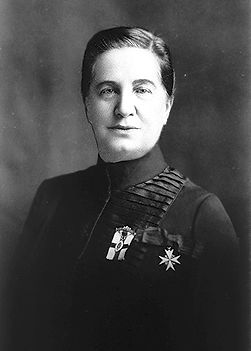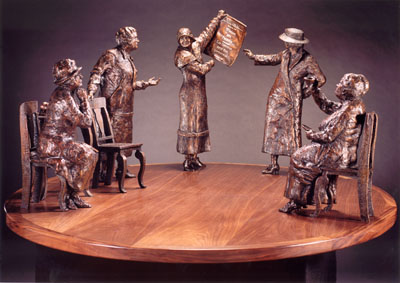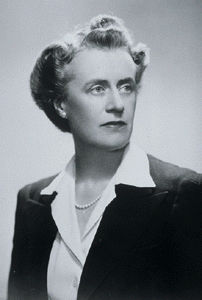Emily Murphy (née Ferguson), pen name Janey Canuck, writer, journalist, magistrate, political and legal reformer (born 14 March 1868 in Cookstown, ON; died 27 October 1933 in Edmonton, AB). Emily Murphy was the first woman magistrate (justice of the peace) in the British Empire. She was also one of the Famous Five behind the Persons Case. It ruled that women were persons in the eyes of the law. Murphy was an outspoken feminist and suffragist. She is also controversial. Her views on immigration and eugenics have been seen as racist and elitist. She was named a Person of National Historic Significance in 1958. She was made an honorary senator in 2009.
This article is a plain-language summary of Emily Murphy. If you are interested in reading about this topic in more depth, please see our full-length entry: Emily Murphy.

Family
Emily Murphy was born into a high-profile family. She had many relatives in business, politics and the law. She went to Bishop Strachan School in Toronto. While in Toronto, she met Arthur Murphy, a theology student. They married and in 1903 they moved to Swan River, Manitoba. Arthur was an Anglican minister and businessman. They had two daughters. In 1907, the family moved to Edmonton.
Author and Activist
Emily Murphy often wrote for magazines and newspapers. Under the pen name Janey Canuck, she published four popular books: The Impressions of Janey Canuck Abroad (1901); Janey Canuck in the West (1910); Open Trails (1912); and Seeds of Pine (1914).
While travelling through Alberta, Murphy met a woman whose husband had left her. He had sold their farm and left her without money or a home. Legally, she had no rights to the property. So Murphy set out to protect women’s property rights. In 1915, Alberta passed the Married Woman’s Home Protection Act. It gave women the right to stop the transfer, mortgage or lease of their home without their consent. In 1917, this was replaced by the Dower Act. It protected a wife’s right to one-third of her husband’s property.
Murphy was also a major figure in the suffrage movement. She was involved with running the Canadian Women's Press Club (president 1913–20), the National Council of Women of Canada, and the Federated Women’s Institutes of Canada (first national president). She also worked with more than 20 other groups.
First Woman Justice of the Peace
Emily Murphy's career took a surprise turn in 1916. That year, some women tried to attend the trial of several women who had been arrested for prostitution. The women were not allowed into the court because the testimony was “not fit for mixed company.” Murphy was outraged. She sent a complaint to Alberta’s Attorney General. “If the evidence is not fit to be heard in mixed company,” she argued, “then... the government … [must] set up a special court presided over by women, to try other women.”
To her surprise, the AG agreed. He offered Murphy the job of being a magistrate (a justice of the peace, or a lay justice) in such a court. Murphy accepted the offer. In 1916, she was made a police magistrate for Edmonton and then Alberta. She was the first woman magistrate in the British Empire. She handled a long line of cases involving prostitution and youths. She became a strong opponent of narcotics. She blamed it for organized crime and for victimizing people.
The Black Candle (1922)
Murphy published a series of articles in Maclean's magazine. In lurid detail, she wrote about the evils of the drug trade. The series formed the basis of the book The Black Candle (1922) by “Judge Murphy.” It led to laws for drugs that were not changed until the late 1960s.
In the book, Murphy talks about Chinese, Greeks and “Negroes” in the drug trade. At the time, there was a lot of concern about immigration among white Canadians. Murphy’s comments both reflected and fuelled these concerns.
Scholars still debate Murphy’s beliefs. Some condemn her for racist and imperial views. Others argue that her main concern was the drug trade itself. They also feel that any talk of her beliefs should take into account the widespread racism of the time.
The Persons Case
Emily Murphy is best known for her role in the Persons Case. On her first day as a magistrate, she was challenged by a lawyer. He argued that, as a woman, she was not a person in the eyes of the law. At the time, women were not defined as persons in the Constitution. This led Murphy to set out on a decade-long campaign to have women declared legal persons.
In August 1927, she invited Henrietta Muir Edwards, Irene Parlby, Louise McKinney and Nellie McClung to meet at her Edmonton home. Murphy had written a petition to send to the Supreme Court of Canada. It concerned how the word persons in the Constitution Act, 1867 is interpreted.
Murphy and the others signed the petition. It asked the Supreme Court whether the word persons in section 24 included women. If it saw women as persons, the Constitution would allow for a woman to serve in the Senate. On 24 April 1928, the Supreme Court said no. So, the five women took their request to the Judicial Committee of the Privy Council in England. It was Canada’s highest court of appeal until 1949.
On 18 October 1929, the Privy Council reversed the decision of the Supreme Court. It concluded that “the word ‘persons’ in sec. 24 does include women, and that women are eligible to be summoned to and become members of the Senate of Canada.” Following this decision, women could receive Senate appointments. But the long-sought appointment was not to be Murphy’s. She died of diabetes in 1933.

Eugenics
Like other members of the Famous Five, Murphy has been criticized as elitist and racist. This was due to her stance on immigration and her support of eugenics. Eugenics was a pseudoscience. It put forth the idea that the human population could be improved by controlling reproduction. J. S. Woodsworth, Dr. Clarence Hincks and Tommy Douglas also supported eugenics. They argued that some people (“mental defectives” and the “feeble-minded”) posed a threat to society. These concerns led to increasing support for eugenic legislation. It included the sterilization of “defectives.”
Like Nellie McClung, Murphy publicly supported eugenics. As a justice of the peace, Murphy had a lot of influence in Alberta. Her support of eugenic policies likely aided the passage of Alberta’s Sexual Sterilization Act in 1928. The Act led to the forced sterilization of people who were seen as “mentally deficient.” Many of them were Indigenous women. The Act was repealed in 1972. By then, thousands of people had been sterilized against their will.
Legacy
Emily Murphy was named a Person of National Historic Significance by the federal government in 1958. In 2009, the Senate recognized the Famous Five as honorary senators. It was the first time the Senate had bestowed the honour.
See also Emily Murphy’s Famous Triumph.


 Share on Facebook
Share on Facebook Share on X
Share on X Share by Email
Share by Email Share on Google Classroom
Share on Google Classroom





